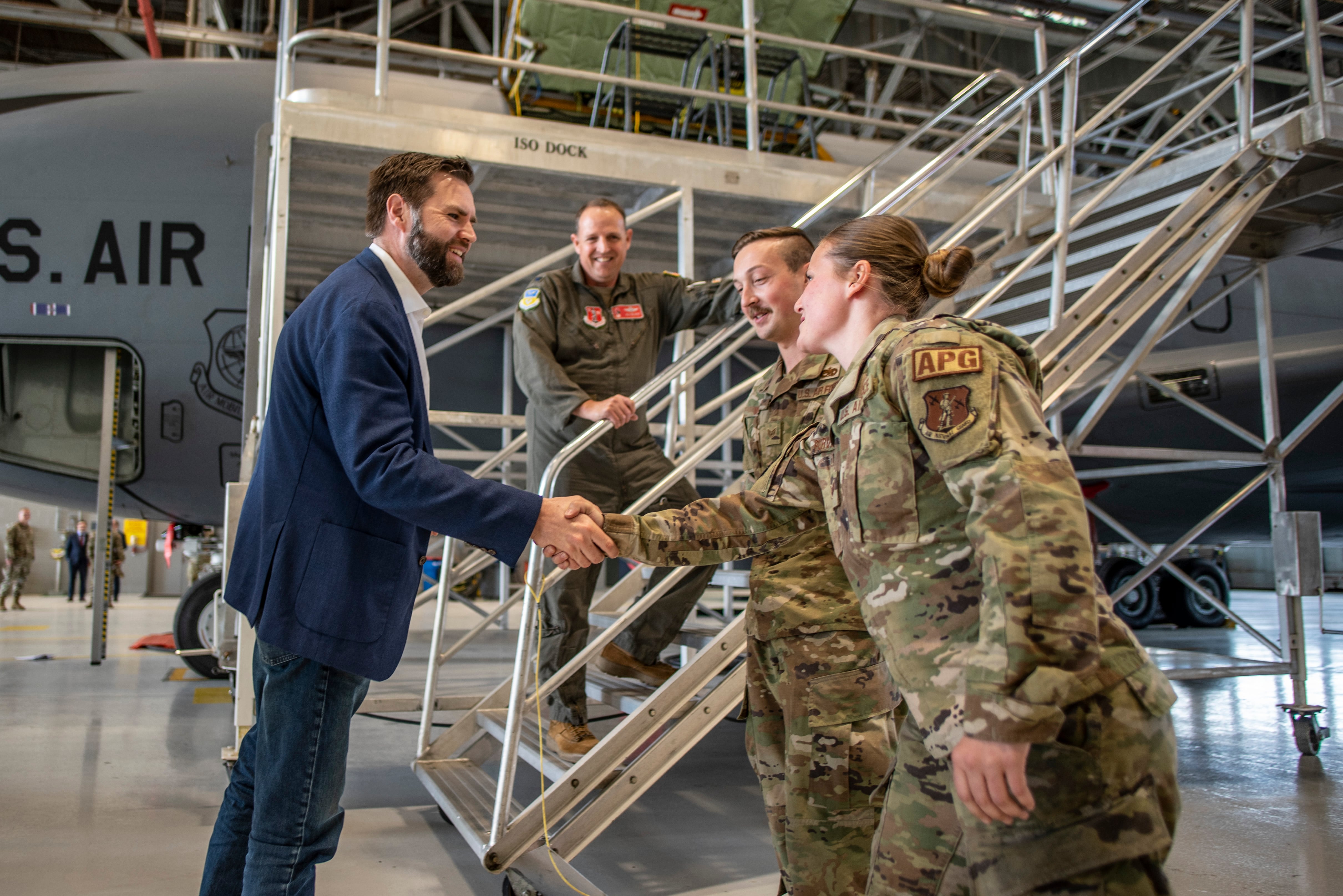JD Vance, named Monday as the Republican vice presidential running mate of former President Donald Trump, is known as many things: a bestselling author, a Republican senator, a former venture capitalist, a leading voice of conservatism, a onetime Trump critic – and a U.S. Marine Corps veteran.
Vance, 39, is the first millennial on a major-party ticket, and a prominent veterans group heralded him Monday as the first among the post-9/11 generation of veterans to appear on a presidential ballot.
“JD Vance may be the first of our generation of veterans to be on a major-party presidential ticket, but he most certainly won’t be the last,” said Allison Jaslow, an Iraq War veteran and the CEO of Iraq and Afghanistan Veterans of America, or IAVA. “The post-9/11 generation of veterans is stepping up to lead, just when America needs us most.”
Vance was raised in Middletown, Ohio, and enlisted in the Marine Corps after graduating high school in 2003. He served a four-year enlistment as a combat correspondent, during which he escorted civilian press and gathered information and wrote articles for a military news service. He deployed to Iraq as a corporal with the 2nd Marine Aircraft Wing in 2005.
IAVA, which has served as a voice for the younger generation of veterans since 2004, praised Trump’s choice of Vance particularly because he served in the enlisted ranks. Before Vance, the most recent veteran on a major-party ticket was John McCain in 2008. Vance is the first veteran of the enlisted ranks on a presidential ballot since Al Gore in 2000.
“We applaud former President Trump for choosing a post-9/11 veteran to join him in his candidacy to be commander-in-chief again, and notably, someone who served in the enlisted ranks and is representative of the average veteran,” Jaslow said.
Trump announced his choice for VP during the Republican National Convention on Monday in Milwaukee. The former president selected Vance from a pool of potential candidates that included Sen. Marco Rubio, R-Fla., Sen. Tim Scott, R-S.C., North Dakota Gov. Doug Burgum and former United Nations ambassador Nikki Haley, among others.
It remained uncertain Tuesday how Trump’s pick might affect polling. During the 2020 presidential race, polling showed that older veterans overwhelmingly backed Trump, while younger veterans and women veterans significantly preferred President Joe Biden.
Not all veterans agree about Vance. Paul Rieckhoff, an Iraq War veteran and the founder and former CEO of IAVA, said Monday that Trump’s VP pick was “more of the same old partisan junk.” Rieckhoff launched Independent Veterans of America earlier this month to encourage veterans to break away from the two major parties and run for political office as independents.
“Vance is not an independent,” Rieckhoff said. “Not even close.... What America really needs now is independent leadership.”

When Vance enlisted in 2003, he believed in the mission of the Iraq War – a belief he now describes as a mistake. Vance reflected on that time of his life during a speech on the Senate floor in April, during which he argued against the U.S. sending aid to Israel, Ukraine and Taiwan.
“I believed the propaganda of the George W. Bush administration that we needed to invade Iraq, that it was a war for freedom and democracy,” Vance said. “I served my country honorably, and I saw when I went to Iraq that I had been lied to, that the promises of the foreign policy establishment of this country were a complete joke.”
Vance detailed his time in the Marine Corps in his bestselling memoir, “Hillbilly Elegy,” which recounts his family’s struggles with poverty and addiction, his Marine Corps service and his journey to Yale Law School.
“When I joined the Marine Corps, I did so in part because I wasn’t ready for adulthood,” Vance wrote. “I didn’t know how to balance a checkbook, much less how to complete the financial aid forms for college. Now I knew exactly what I wanted out of my life and how to get there.”
The memoir skyrocketed Vance to national celebrity after its publication in 2016, which coincided with Trump’s victory in the presidential race that year. At the time, Vance called Trump “dangerous” and “unfit” for office and said he could be “America’s Hitler.” By 2021, Vance had reversed his opinion, citing Trump’s accomplishments as president.
Though he wrote extensively about his Marine Corps service in “Hillbilly Elegy,” Vance said he didn’t want to use his military service to “score political points” during his Senate campaign in 2022.
“I’m very proud of my service... but at the end of the day, it’s not a political talking point,” Vance said on Newsmax that year. “I hate these guys who talk about their military service, not because it’s an important part of their identity, but to deflect against any criticism of their record.”
The Associated Press contributed to this report.
This story was produced in partnership with Military Veterans in Journalism. Please send tips to MVJ-Tips@militarytimes.com.
Nikki Wentling is a senior editor at Military Times. She's reported on veterans and military communities for nearly a decade and has also covered technology, politics, health care and crime. Her work has earned multiple honors from the National Coalition for Homeless Veterans, the Arkansas Associated Press Managing Editors and others.




